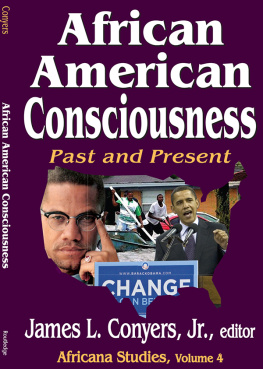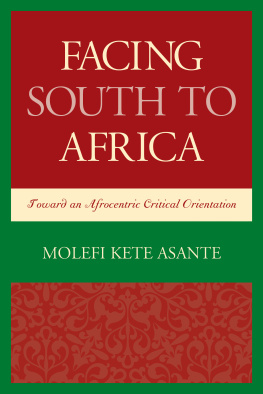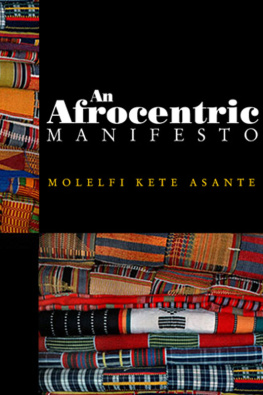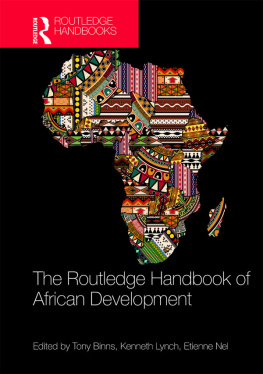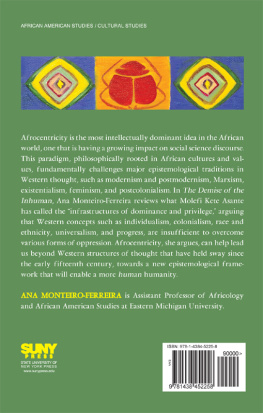First published 2005 by Transaction Publishers
Published 2017 by Routledge
2 Park Square, Milton Park, Abingdon, Oxon OX14 4RN
711 Third Avenue, New York, NY 10017, USA
Routledge is an imprint of the Taylor & Francis Group, an informa business
Copyright 2005 by Taylor & Francis.
All rights reserved. No part of this book may be reprinted or reproduced or utilised in any form or by any electronic, mechanical, or other means, now known or hereafter invented, including photocopying and recording, or in any information storage or retrieval system, without permission in writing from the publishers.
Notice:
Product or corporate names may be trademarks or registered trademarks, and are used only for identification and explanation without intent to infringe.
Library of Congress Catalog Number: 2004063672
Library of Congress Cataloging-in-Publication
Afrocentric traditions / James L. Conyers, Jr., editor.
p. cm.(Africana studies ; v. 1)
Includes bibliographical references and index.
ISBN 1-4128-0478-7 (pbk. : alk. paper)
1. African AmericansStudy and teaching. 2. African AmericansIntellectual life. 3. Afrocentrism. 4. AfricanAmericansSocial conditions. I. Conyers, James L. II. Series.
E184.7.A344 2005
960'.072dc22
2004063672
ISBN-13: 978-1-4128-0478-3 (pbk)
Africana Studies:
A Review of Social Science Research
Editor
James L. Conyers, Jr., University of Houston
Assistant Editor
Ahati N.N. Toure, University of Houston
Graduate Assistants
Kady Kante, Leah McAlister Shields, University of Houston
Book Review Editor
Andrew P. Smallwood, University of Houston
Editorial Board
Dr. Delores P. Aldridge, Emory University
Dr. Molefi K. Asante, Temple University
Dr. Cary Wintz, Texas Southern University
Dr. James Turner, Cornell University
Dr. Julius E. Thompson, University of Missouri at Columbia
Dr. James B. Stewart, Pennsylvania State University
Dr. Alan Colon, Dilliard University
Dr. Reiland Rabaka, California State University at Long Beach
Dr. Anthony Pinn, Rice University
Dr. Anthony Lemelle, University of Wisconsin at Milwaukee
Dr. Kobi K.K. Kambon, Florida A & M University
Dr. Shawn R. Donaldson, The Richard Stockton College of New Jersey
Dr. Gerald Home, University of Houston
Dr. Janis Hutchinson, University of Houston
Dr. Jane Dabel, California State University at Long Beach
Dr. W. Lawrence Hogue, University of Houston
1
Afrocentricity: Notes on a Disciplinary Position
Molefi Kete Asante
Over the past twenty-five years, the field of Africology has blossomed into a full-blown intellectual arena where the mammoths of post-colonial theory, Marxism, postmodernism, feminism, and other Eurocentric ideas have been taken on with vigor and integrity. Perhaps not since the days of the universities in West Africa or the Nile Valley Kemetic institutions have scholars looking through African eyes, unveiled, been able to see so clearly the dimensions and scopes of our own intellectual work. It is my intention in this chapter to draw attention to some of the general ideas necessary to advance the Afrocentric idea.
Definition
The Afrocentric idea is essentially about location. Since Africans have been moved off of terms culturally, psychologically, economically, and historically, it is important that any assessment of the African condition in whatever country be made from an Afrocentric location. We begin with the view that Afrocentricity is a quality of thought, practice, and perspective that perceives Africans as subjects and agents of phenomena acting in their own cultural image and human interest.
Stating a definition does not exhaust the power of a concept; it may in fact create further difficulties unless it is explained in such a way as to elucidate the idea. Afrocentricity is about location precisely because African people have been operating from the fringes of the Eurocentric experience. Much of what we have studied in African history and culture, or literature and linguistics, or politics and economics, has been orchestrated from the standpoint of Europes interests. Whether it is a matter of economics, history, politics, geographical concepts, or art, Africans have been seen as peripheral to the real activity. This off-centeredness has impacted Africans as well as whites in the United States. Thus, to speak of Afrocentricity as a radical re-definition means that we seek the re-orientation of Africans to a centered position (Asante, 1998).
Conscientization
Afrocentricity emerged as a process of political consciousness for a people who existed on the edge of education, art, science, economics, communication, and technology as defined by Eurocentrists. If the process were successful then the re-centering of the people would create a new reality and open another chapter in the liberation of the minds of Africans. This was the hope of Afrocentricity when I published the book Afrocentricity in 1980. The aim was to strike a blow at the lack of consciousness, not simply the lack of consciousness of our oppression but the lack of consciousness of what victories were possible. One could begin to analyze human relationships, multicultural interactions, texts, phenomena and events, and African liberation from the standpoint of orientation toward facts.
The objective has always been to create space for conscious human beings who are, by virtue of their centeredness, committed to sanity. The idea of conscientization is at the center of Afrocentricity because this is what makes it different from Africanity. One can practice African customs and mores and not be Afrocentric. Afrocentricity is conscientization related to the agency of African people. One cannot be Afrocentric without being a conscious human being. This is the key to re-orientation and re-centering.
Africans have been negated in the system of white racial domination. This is not mere marginalization, but the obliteration of the presence, meaning, activities, or images of the African. This is negated reality, a destruction of the spiritual and material personality of the African person. Therefore, the African must, to be conscious, be aware of everything and seek to escape from the anomie of fringeness. This is a linguistic problem at one level but at another level it is a problem of dealing with the reality of constructed economic and cultural situations.
Afrocentricity is not religion and that is why the constituents of African values are debatable, even though they are central to Afrocentric inquiry. There are no closed systems; that is, there are no ideas that are absolutely seen as off limits for discussion and debate. Thus, when Afrocentricity is employed in analysis or criticism it opens the way for examination of all issues related to the African world.



